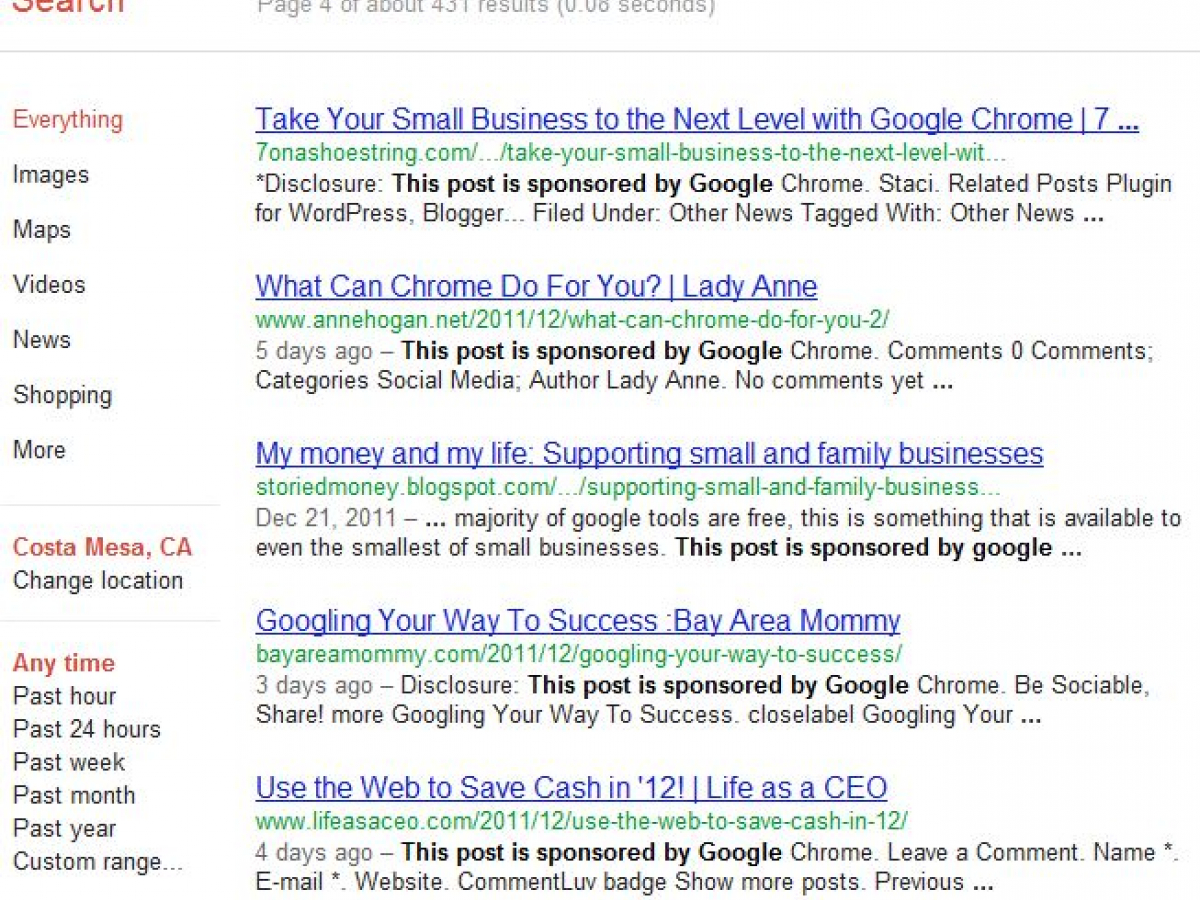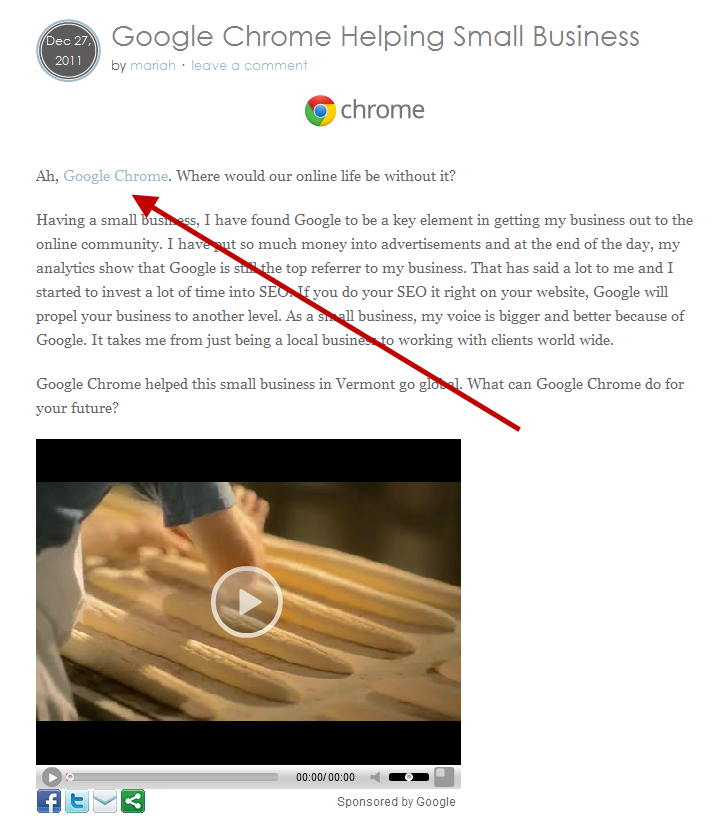
This day in search marketing history: January 2
Google’s jaw-dropping sponsored post campaign for Chrome
In 2012, Google – a search engine known for fighting against paid links and “thin” content – seemed to be behind a campaign that generated both on behalf of its Chrome browser.
A search for [This post is sponsored by Google] returned more than 400 pages, written apparently as part of a Google marketing campaign:

Google? Buying links? It sure looked like it:

It was also hypocritical because Google was paying to produce the same type of garbage that its Panda Update was designed to penalize.
What was Google thinking? This was just the beginning of the story. See Search Engine Land’s follow-up stories:
- Google: Yes, Sponsored Post Campaign Was Ours But Not What We Signed-Up For
- Google’s Chrome Page No Longer Ranks For “Browser” After Sponsored Post Penalty
Also on this day
Online tax-filing services can no longer hide free services from Google Search results
2020: The IRS revised its Free File agreement with online tax return software providers, requiring them to allow their Free File landing pages to be indexed by search engines and backing out of its pledge not to enter the e-file services marketplace.
The big PPC shifts of 2019 that will shape how we market in 2020
2020: Automation, full-funnel campaigns, shoppable ads and privacy-fueled paid search changes in 2019.
What makes people click on search ads?
2020: Did people click on a paid search ad because it answered a search query, mentioned a familiar brand, was listed above other search results, or had a compelling title, description, or image? Survey says…
Bing Ads offers agencies chance at prizes for accreditation, new accounts, more
2019: The sweepstakes offered incentive for agencies to increase their participation with Bing Ads.
Google’s Mueller spent New Year’s helping SEOs tackle hacked content, slow website issues
2019: John Mueller, a Google webmaster trends analyst, spent a portion of his New Year’s break responding to concerns and questions around Google search-related issues. Here’s what kept him occupied.
Google emphasizes ‘Message this business’ in new local search test
2019: Google was testing a bigger push for the messaging option within the local panel, by using a larger message button.
Google search tests new interface for movie, TV show streaming options
2019: Google was testing a change in the search results for movie and TV show streaming options, adding more streaming providers and options.
There’s nothing stopping climate change deniers from using Google AdWords
2018: Advertisers didn’t have to do anything special or out of the ordinary to get Google’s algorithms to display their ads. It wouldn’t be until 2021 that Google prohibited advertisers from running ads or monetizing content that contradicted scientific consensus on climate change.
Report: Amazon in discussions with consumer brands about ads on Alexa [company denies it]
2018: Amazon was reportedly in talks with several large consumer product companies, such as Procter & Gamble, about advertising and sponsorship opportunities through Alexa and voice search. However, Amazon denied the story, saying it had no plans to introduce ads on Alexa.
New search quality raters guidelines for Google Assistant and voice search evaluations
2018: Similar to the web search quality guidelines, raters evaluated voice responses from Google Assistant for information satisfaction, length, formulation and elocution.
Yahoo Search Back Online After 4+ Hour Outage; Bing Went Down Earlier Friday
2015: The outage to Yahoo’s dedicated search site lasted more than four hours.
Search In Pics: Google Winter Vacation, Boot Loops Cereal & Penguin Appetizers
2015: What people eat at the search engine companies, how they play, who they meet, where they speak, what toys they have, and more.
Rumor: Apple May Buy Crowdsourced Mapping App Waze
2013: Spoiler alert: Apple didn’t get the crowd-sourced mapping and traffic app. But Google did later in 2013, for $1.3 billion.
Report: Google Antitrust Settlement Coming Tomorrow, Opponents Frustrated With FTC
2013: Google agreed to change some business practices and settle allegations it misused patents to thwart smartphone competitors.
Larry Page named “CEO Of The Year”
2012: Why? Because Page “reorganized the company’s management structure, redesigned the face of the company’s products and pushed forward with a multibillion-dollar deal to acquire a cellphone manufacturing outfit.
Google Launches US Election Hub Website
2012: It was similar to the Google News “Elections” section, but with different filtering options on news content and added data related to this year’s campaigns.
Activate The “Bells and Whistles” On Google’s iPhone Mobile App
2009: Surprise! Google’s iPhone app had a few extra hidden options in the Settings tab.
Report: Android OS Coming To Netbooks
2009: An Android OS netbook by 2010? Could it be? Well, actually, it didn’t even take that long, as Acer-produced netbooks were shipped starting in Q3 of 2009. (Dell was also looking at Android for netbook OS.) Oh, what was a netbook? A smaller-than-typical laptop computer (R.I.P, 2007-2013).
Google’s Algorithm Awarding New Pages?
2008: Google seemed to be showing a bit too much love to new or very recent pages indexed by Google, ranking those pages extremely well for queries.
Baidu Beats Music Labels In Music Copyright Case Again
2008: A Beijing appeals court upheld a decision that Baidu was not guilty of property rights infringement for displaying links to websites offering illegal music downloads.
WhatsOpen Aims To Disseminate Local Business Hours Data Across Platforms
2008: The “social search engine” launched its public beta and seemed to be a “feature” rather than a fully developed new local concept.
Google To Make Stronger Effort With Blogging & Communication In 2007?
2007: Matt Cutts called for Google to have more people blogging and monitoring communities interested in their products.
More Google Q&A Spam
2007: Google Q&A spam was spotted for a search on [how tall is paris]. The results led to an adult site.
YouTube’s “Content Identification System” Delay May Hurt Google’s Plans
2007: An anticipated software release by YouTube to crack down on pirated videos with a “content identification system” software was delayed.
SMBs, Paid Search And Self-Service
2007: The question was: how many SMBs will sign up directly for paid search and how many must be acquired through a “push” channel (local sales force)? Some were convinced that a sales force is absolutely necessary for Google, Yahoo and Microsoft to acquire any meaningful penetration in the SMB market.
Google’s Manhattan Office Attractive & Inviting
2007: Translating the Googleplex Mountain View office company culture to New York seemed to be working out just fine.
Google Patches Serious Gmail Contacts Bug
2007: A serious bug was fixed in Google’s Gmail. It allowed websites to retrieve a user’s Gmail contact list through a JavaScript loophole.
Search Engine Land Stats: 2007, In Review
2008: Some key stats reveal how Search Engine Land had grown over the past calendar year.
Best | top | most popular Search Engine Land stories of the year
Early January is a good time to take a final look back at the most popular stories from the past year. Check out what stories earned the most pageviews and social love in prior years:
- Search Engine Land’s Top Tweeted Stories Of 2012: Pandas, Google and a Zuckerberg
- What Search & Conversion Articles Clicked With You (2012)?
- The Hottest Reads In Search & Social In 2012
Past contributions from Search Engine Land’s Subject Matter Experts (SMEs)
These columns are a snapshot in time and have not been updated since publishing, unless noted. Opinions expressed in these articles are those of the author and not necessarily Search Engine Land.
- 2019: Google Shopping is largest growth opportunity for most online retailers in 2019 by Andy Taylor
- 2019: ‘Hey Alexa, how do I get my product visible in Amazon search in 2019?’ by Brittany Page
- 2019: 2019 in search: Find your seamlessness by Alexis Sanders
- 2019: Shopping ads for the small budget: Here’s what to expect in 2019 by Kirk Williams
- 2019: What you need to know about Yelp’s latest update dubbed ‘Ghost’ by Craig Mount
- 2018: 18 link resolutions for 2018 by Julie Joyce
- 2018: Do you have a shot at ranking for that phrase? by Eric Enge
- 2015: Breaking The Glass Ceiling Of Search Through Acquisition by Matthew Barby
- 2014: Succeeding With Content In A Mobile World by Barbara Starr
- 2014: The B2B Marketer’s Guide to Baidu SEO by Harrison Jones
- 2012: How Savvy Is Your AdWords Account? 7 Areas To Audit by Brad Geddes
- 2012: Predictions For Local Search In 2012 – Year Of The Dragon by Chris Silver Smith
- 2012: How To Improve Mobile Commerce SEO Using JQM by Sherwood Stranieri
- 2009: Internet Shopping Usability: No Guidance, No Interaction, No Sale by Kim Krause Berg
- 2008: Inside Information: Interviews With In-House Search Marketers – Part 2
- 2008: A B2B Search Marketer’s New Year’s Resolutions by Brian Kaminski
- 2007: New Duplicate Content and Mapping Patents from Google – January 2, 2007 by Bill Slawski
< January 1 | Search Marketing History | January 3 >
The post This day in search marketing history: January 2 appeared first on Search Engine Land.
from Search Engine Land https://searchengineland.com/search-marketing-history-january-2-389507
via free Seo Tools